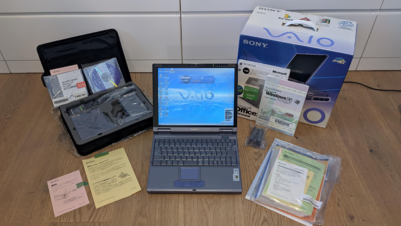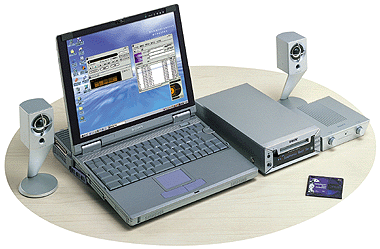PCG-XG: Difference between revisions
More actions
gpu info added |
No edit summary |
||
| Line 1: | Line 1: | ||
[[File: | [[File:Boxed PCG-XG-XR.png|alt=Boxed PCG-XG/XR|thumb|401x401px|Boxed PCG-XG/XR]] | ||
== Overview == | == Overview == | ||
[[File:PCG-XG with MiniDisc drive MDS-PC2 and external speakers.png|alt=PCG-XG with MiniDisc drive MDS-PC2 and external speakers|thumb|380x380px|PCG-XG with MiniDisc drive MDS-PC2 and external speakers]] | |||
The Sony VAIO PCG-XG is a series of mid-size Pentium III-based laptops, released in 2000. Models in the series include the PCG-XG19, PCG-XG28, PCG-XG28K, PCG-XG29, PCG-XG29K, and PCG-XG700. | The Sony VAIO PCG-XG is a series of mid-size Pentium III-based laptops, released in 2000. Models in the series include the PCG-XG19, PCG-XG28, PCG-XG28K, PCG-XG29, PCG-XG29K, and PCG-XG700. | ||
They were a refresh of the PCG-XR with the exact same design but updated specs (Replaced the PCG-XR's Pentium II with a Pentium III, added more RAM, a bigger HDD and other minor improvements). The images used are the PCG-XR, though they both look the exact same so that doesn't matter. | |||
This was Sony's top of the line laptop in 2000 and has a beautiful magnesium build. It shipped with a dock which attaches to the back of the unit and is quite bulky, though it adds many inputs and outputs to the laptop, as many as a traditional desktop would have had at the time. | |||
Sony intended the laptop for multimedia and work usage, as a sort of all rounder. Being their most powerful, it was a good choice for professionals and consumers who wanted a good multimedia experience, as shown in Sony's product image with the external speakers and MDS-PC2 MiniDisc drive. | |||
== Detailed Specs == | == Detailed Specs == | ||
'''Processor:''' Mobile Intel Pentium III | '''Processor:''' Mobile Intel Pentium III at 650 or 750MHz | ||
'''Graphics:''' NeoMagic MagicMedia 256XL w/ 6MB VRAM | '''Graphics:''' NeoMagic MagicMedia 256XL w/ 6MB VRAM | ||
Revision as of 00:52, 30 July 2024

Overview

The Sony VAIO PCG-XG is a series of mid-size Pentium III-based laptops, released in 2000. Models in the series include the PCG-XG19, PCG-XG28, PCG-XG28K, PCG-XG29, PCG-XG29K, and PCG-XG700.
They were a refresh of the PCG-XR with the exact same design but updated specs (Replaced the PCG-XR's Pentium II with a Pentium III, added more RAM, a bigger HDD and other minor improvements). The images used are the PCG-XR, though they both look the exact same so that doesn't matter.
This was Sony's top of the line laptop in 2000 and has a beautiful magnesium build. It shipped with a dock which attaches to the back of the unit and is quite bulky, though it adds many inputs and outputs to the laptop, as many as a traditional desktop would have had at the time.
Sony intended the laptop for multimedia and work usage, as a sort of all rounder. Being their most powerful, it was a good choice for professionals and consumers who wanted a good multimedia experience, as shown in Sony's product image with the external speakers and MDS-PC2 MiniDisc drive.
Detailed Specs
Processor: Mobile Intel Pentium III at 650 or 750MHz
Graphics: NeoMagic MagicMedia 256XL w/ 6MB VRAM
RAM: PC100 SDRAM - 128MB Standard, 256MB Maximum
Display: 13.3 or 14.1-inch TFT LCD @1024x768
Storage: 2.5" IDE - 12, 18.1, or 20GB Standard
Networking: Modem
OS: Windows 98 or Windows Me
Drives: Modular bay supporting the following: DVD-ROM, CD-RW, Floppy Drive, 2nd Battery, 2nd HDD
I/O: VGA Out, Docking connector, 1x USB, S400 i.LINK (FireWire), Headphone Out, Microphone In, Infrared, 2x PCMCIA/CardBus Slots
Daily Usage Today
The PCG-XG is obsolete for any modern computing task aside from text editing. Due to its NeoMagic graphics processor, it is also not especially well suited to retro gaming, though there are still plenty of games that will run on it.
